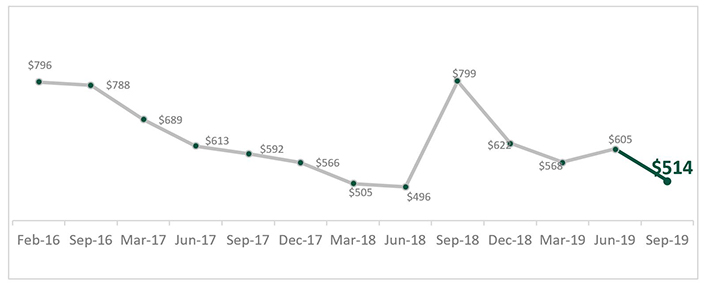Stable interest rates are a cold comfort to those already struggling to make ends meet.
Halifax, NS –October 28, 2019 – Despite the Bank of Canada stating it will keep interest rates stable until next year, more than 6 in 10 (62%) Atlantic Canadians say they are more concerned about their ability to repay debts than they used to be — the highest proportion compared to other provinces. This could be the result of declining wiggle room in household budgets. After paying all their current bills and debt obligations, Atlantic Canadians have $514 left at the end of the month on average; a drop of $91 since June. More than half (56%, +13 pts) now say they are left with less than $200, including 3 in 10 (29%) who already don’t make enough money to cover all their bills and debt obligations (+6 pts).
The findings are part of the latest MNP Consumer Debt Index conducted quarterly by Ipsos. Now in its tenth wave, the Index tracks Canadians’ attitudes about their consumer debt and perception of their ability to meet monthly payment obligations.
Average Finances Left at Month-End
“The number who say they are less than $200 away from not being able to pay their bills jumped more than 10 points since June. There are a lot of very financial vulnerable people right now — many who do not have enough cash for inevitable life events like a car repair,” says Joe Willkie, a Licensed Insolvency Trustee with MNP LTD — the country’s largest personal insolvency practice.
It’s no surprise that, with less in the bank at month-end, Atlantic Canadians’ ability to cope with unexpected expenses has shaken. Seven in ten (71%) are not confident in their ability to cope with life-changing events — such as a divorce, unexpected auto repairs, loss of employment or the death of a family member — without increasing their debt.
“Unexpected expenses can plague people regardless of age or income, but they're most devastating for people who already have a large amount of debt. They can drive people to take on high interest loans, which begins a cycle of increasing servicing costs and eventual default,” says Wilkie.
With fewer dollars left at month-end to buffer them from sudden expenses, Atlantic Canadians’ positivity about their personal financial situations is waning. According to the index, one in five (19%) say their debt situation is better than it was a year ago (-2 pts) and one-third (33%) say it is better than five years ago (-2 pts). Looking at the future, 4 in 10 (38%) expect their debt situation will be better a year from now (-3 pts) and half (50%) believe it will be better 5 years from now (unchanged).
“Interest rates may be stable, but that is a cold comfort to those already struggling to make their debt payments at the current rate. The fact remains many are positively swimming in debt and most don’t have a clear path to repayment,” says Wilkie, pointing to evidence from the research showing many may intend to take on more credit to make ends meet over the next year.
Four in ten (40%) Atlantic Canadians say they don’t think they will be able to cover all their living and family expenses for the next 12 months without going further into debt, a 5-point increase since June. Compared to other provinces, they are the least likely to be confident they won’t have any debt in retirement (43%), a four-point drop.
“I think many people are unsure about how or if their debts will ever be repaid. They may have resigned themselves to being indebted for the rest of their lives; especially if there is a significant future increase in interest rates” says Wilkie.
A large portion of Atlantic Canadians (52%) are concerned about how rising interest rates will impact their financial situation, up four points since June. Forty-five percent agree if interest rates go up much more, they are afraid they will be in financial trouble (-3 pts). Finally, nearly 4 in 10 (37%) are still concerned rising interest rates could move them towards bankruptcy (-2 pts).
“If you feel like your debt is out of control, get debt relief advice from a professional. Beyond taking on more debt to deal with debt, the single biggest mistake people make is waiting too long to seek help.”
MNP LTD offers Free Confidential Consultations with Licensed Insolvency Trustees to help individuals understand their debt relief options. Licensed Insolvency Trustees are the only government-regulated debt professionals who offer a full range of debt relief options and can guarantee legal protection from creditors through Consumer Proposals and Bankruptcies.
About MNP LTD
MNP LTD, a division of the national accounting firm MNP LLP, is the largest insolvency practice in Canada. For more than 50 years, our experienced team of Licensed Insolvency Trustees and advisors have been working with individuals to help them recover from times of financial distress and regain control of their finances. With more than 230 offices from coast-to-coast, MNP helps thousands of Canadians each year who are struggling with an overwhelming amount of debt. Visit MNPdebt.ca to contact a Licensed Insolvency Trustee or use our free Do it Yourself (DIY) debt assessment tools.
About the MNP Consumer Debt Index
The MNP Consumer Debt Index measures Canadians’ attitudes toward their consumer debt and gauges their ability to pay their bills, endure unexpected expenses and absorb interest-rate fluctuations without approaching insolvency. Conducted by Ipsos and updated quarterly, the Index is an industry-leading barometer of financial pressure or relief among Canadians. Visit www.MNPdebt.ca/CDI to learn more.
The latest data, representing the tenth wave of the MNP Consumer Debt Index, was compiled by Ipsos on behalf of MNP LTD between September 4 – 9, 2019. For this survey, a sample of 2,002 Canadians aged 18 years and over was interviewed. The precision of online polls is measured using a credibility interval. In this case, the results are accurate to within +2.5 percentage points, 19 times out of 20, of what the results would have been had all Canadian adults been polled. The credibility interval will be wider among subsets of the population. All sample surveys and polls may be subject to other sources of error, including, but not limited to coverage error and measurement error.
A summary of the provincial data is available by request.



